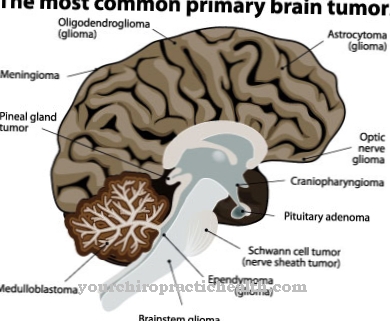The West Nile fever is a mostly harmless infectious disease. Medical measures usually only serve to combat symptoms.
What is West Nile Fever?
At the West Nile fever it is an infectious disease caused by viruses. West Nile fever owes its name to the West Nile district in Uganda, Africa. In 1937, evidence of an infection with the virus causing West Nile fever was provided here for the first time.
Since symptoms are absent in many cases of West Nile fever, it is hardly possible to give an indication of the worldwide frequency of West Nile fever. However, West Nile fever occurs mainly in warm climates such as parts of Africa, India or Southeast Asia. In addition, a West Nile fever epidemic occurred in North America during the summer of 2002.
In humans, infection with West Nile fever is not subject to reporting requirements. However, if animals are infected with the virus that causes West Nile fever, there is an animal disease that must be reported.
causes
The cause of that West Nile fever is an infection with the so-called West Nile Virus (WNV). Transmitters of the virus, which is responsible for West Nile fever, include insects and mosquitoes in particular.
Since West Nile fever is transmitted from animals to humans, the virus infection carries the name Zoonosis: Wild birds are often initially affected by West Nile fever; Mosquitoes that have come into contact with animals infected with West Nile fever can then transmit the virus to humans.
West Nile fever can also be caused by an infection that occurs from person to person: Such a transmission can occur, for example, during organ transplants or blood transfusions. The virus responsible for West Nile fever may also be transmitted from breastfeeding mothers to their babies.
Typical symptoms & signs
- fever
- a headache
- Body aches
- diarrhea
- nausea
- Vomit
- Swelling of the lymph nodes
- skin rash
Diagnosis & course
The West Nile fever can hardly be diagnosed based on symptoms. One of the reasons for this is that possible symptoms are unspecific and West Nile fever is often completely symptom-free.
A reliable diagnosis of West Nile fever is therefore primarily possible with the help of blood samples: In people who are infected with West Nile fever, the pathogen can usually be detected in the blood. Antibodies that form in the blood or cerebrospinal fluid in the presence of West Nile fever also enable a diagnosis.
The incubation period for West Nile fever is usually a few days. If West Nile fever is accompanied by symptoms, then these are usually similar to the symptoms of a mild flu. West Nile fever is predominantly self-limiting; this means that the symptoms resolve themselves within a few days.
In a clear majority of those affected, West Nile flu runs smoothly. Risk factors for complications with West Nile fever are, for example, other physical illnesses or old age.
Complications
In most cases, West Nile fever is unproblematic and subsides after about seven days. Certain factors play a role in the course of the disease, such as the age of the patient, the immune system as well as physical illnesses and psychological factors. Complications are rather rare and if they do, then mostly elderly or immunocompromised people are affected.
These people can develop heart muscle inflammation, meningitis or paralysis. If the course is severe, it makes sense that the patient is treated as an inpatient so that the course can be better monitored. This particularly affects older people or people with an immune deficiency, because the disease can be life-threatening for them.
Deaths are rare, but some patients retain long-term effects after the illness has been overcome, especially if the brain was also affected. But even people with an unproblematic course can still suffer from body aches, concentration and memory problems and fatigue months after the West Nile fever.
When should you go to the doctor?
If a stay abroad is planned, it is generally advisable to obtain sufficient information about the local conditions. The person affected should build up knowledge of the health risks and, if necessary, consult the attending physician. The state of hygiene should be found out in good time and the likelihood of certain diseases should be inquired about.In some cases, vaccinations are recommended so that the organism can adequately defend itself against the pathogens.
West Nile fever occurs only in people who are in African, Southeast Asian or Indian areas. For this reason, appropriate precautionary measures to maintain health are advisable before traveling to this region. In principle, however, there is no increased risk of a serious illness with the infectious disease. Nevertheless, a doctor should be consulted as soon as health impairments become apparent. If you have a fever, headache, digestive tract disorders or swelling of the lymph, a doctor is advised.
Feeling sick, feeling generally unwell, nausea, and vomiting indicate a health condition that should be diagnosed and treated. Changes in the appearance of the skin, irregularities in locomotion and an increase in existing symptoms should be discussed with a doctor. Medical treatment is necessary so that the symptoms can be alleviated as quickly as possible. Itching and swelling of the skin should also be assessed by a doctor.
Treatment & Therapy
In the majority of cases this is necessary West Nile fever no medical treatment. Healing usually takes place within a few days. If West Nile fever is accompanied by severe symptoms, a sensible measure can include keeping the patient in bed rest.
Accompanying this, in the case of strong West Nile fever, symptoms can be alleviated in consultation with the attending physician; Appropriate measures can include lowering the fever and / or an adequate supply of fluids.
Only in very rare cases with West Nile fever is specialist care required as part of a hospital stay; Such a step can be useful, for example, if there is a greatly increased risk of complications in connection with West Nile fever (such as the risk of suffering from inflammation of the brain or heart).
Targeted medicinal preparations for combating West Nile fever are currently not available to medicine.
prevention
The West Nile fever can only be prevented to a limited extent, as there are as yet no vaccines that can be used against West Nile fever in humans. Measures that can serve as an individual prophylaxis against West Nile fever are aimed at avoiding mosquito bites in areas affected by West Nile fever: For example, it can be useful to apply anti-mosquito sprays. Wearing long clothes can also help to avoid mosquito bites and thus West Nile fever.
Aftercare
Follow-up care for West Nile fever is based on the symptoms that the patient shows and the course of the disease. If the outcome is positive, the symptoms subside within three to fourteen days. The patient then has to visit the doctor again, who will perform a routine examination.
It is also necessary to clarify the symptoms. The medication with antibiotics can then be tapered off. An anamnesis is also taken as part of the follow-up care. Furthermore, measures must be taken to avoid re-infection. If the symptoms occur after a trip abroad, any fellow travelers should also be examined.
The same applies to family members who have had contact with the sick person. The therapy itself is over after seven days. It is limited to relieving symptoms through rest and adequate sleep. Treatment and follow-up care should take place in hospital so that complications can be responded to quickly.
Follow-up care is carried out by the responsible internist or the family doctor. If the course is severe, other specialists must be consulted. If permanent damage is to be expected, psychological support is often necessary for the patient.
You can do that yourself
The flu-like symptoms of West Nile fever usually subside within a week, even without treatment. In order for the body to be able to fight the infection successfully, it needs a lot of rest: Sick people should take it easy during this time and avoid sport and heavy physical work. Light, vitamin-rich food supports the immune system, and stomach-friendly foods such as rusks, gruel or vegetable porridge made from boiled carrots and potatoes help with nausea and vomiting. In herbal medicine, ginger is used successfully against nausea as a spice, tea or in the form of capsules from the pharmacy. Fever can be reduced with simple home remedies such as leg wraps, but should not be used if you have chills.
A lot of fluid is lost through profuse sweating: In order to prevent circulatory disorders, adequate fluid intake is extremely important. Unsweetened herbal teas or a lightly salted chicken broth are best for this. Linden blossom and elderflower teas are known for their sweat-inducing and anti-inflammatory effects, willow bark tea can relieve pain.
If the symptoms do not improve within a week or if symptoms of incipient meningitis appear (severe headache, photophobia, stiff neck), further self-treatment should be avoided and a doctor should be consulted immediately. Prophylactic protection against mosquito bites is recommended in endangered regions by using insect repellants and appropriate clothing.





.jpg)
.jpg)






.jpg)

.jpg)
.jpg)











.jpg)